
This September, I was lucky enough to attend the Reclaiming STEM West Coast workshop in Irvine, California. It was an incredibly impactful experience that is hard to describe. Overall, I was amazed by the work that is being done for inclusion in STEM, but also left wondering whether minorities in STEM must bear the burden of doing this work on our own.
Reclaiming STEM is a workshop created by Evelyn Valdez-Ward and Dr. Linh Anh Cat. The Reclaiming STEM twitter summarizes the event as a diverse and inclusive sci-comm workshop, to empower scientists to use STEM for social justice. They discuss exactly why they created the workshop in this article for Sister STEM.
In attendance were 120 underrepresented minority scientists. These scientists were people of colour, women, Latinx, first-generation graduate students, low-income, undocumented, LGBTQIA+, disabled, and more. There were many speakers and workshops, and the complete program can be found here.
The keynote was given by Laura P. Minero. Laura (She/Her/Ella) is a doctoral candidate in the Counseling Psychology department at University of Wisconsin-Madison. Laura is an undocumented queer woman of colour. She was brought to America when she was a child, and was never able to obtain US citizenship. She spoke on how this has made her academic career challenging- for example, Laura was unable to apply for many scholarships when she started university. She must be careful when travelling, which is difficult as a researcher. Despite these challenges, Laura is an extremely successful researcher, and has even led initiatives to protect undocumented students in the USA. Learn more about Laura here.
Laura also spoke on an issue specific to her field, the WEIRD problem, where up to 80% of clinical research participants are Western, Educated, Industrialized, Rich and Democratic. This population represents only 12% of the earth’s population. This problem is an example of how the diversity issue in STEM goes beyond minority scientists, and is directly affecting the quality of research.
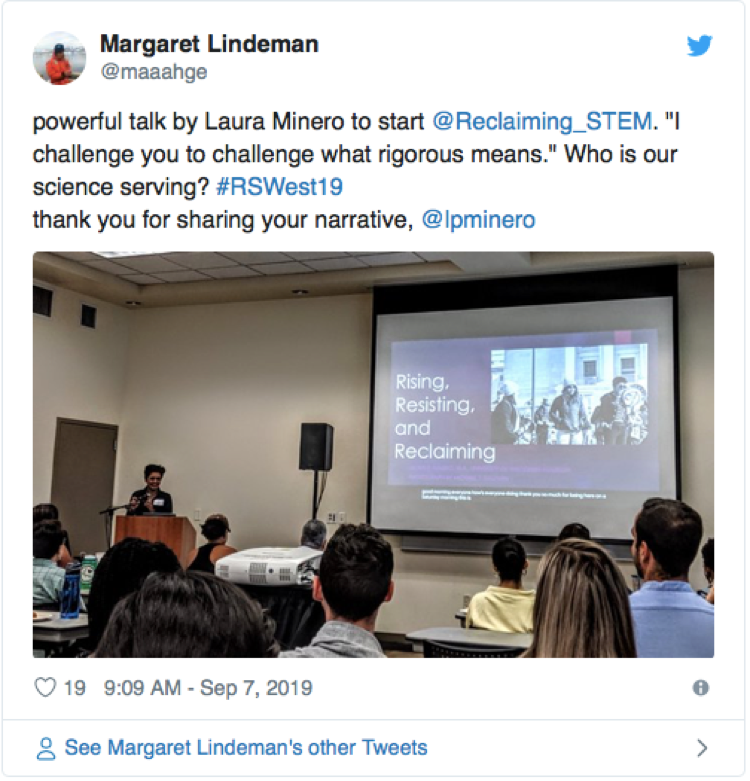
Other talks highlighted work being done by minority scientists. Dr. Leslie Berntsen (she/her) recounted how twitter bullying led to the creation of the blog Unique Scientists. Allison Mattheis (she/her/hers) and Dr. Jeremy B. Yoder (he/him) gave a joint presentation on the results of their collaborative study, “A model of Queer STEM identity in the workplace”.
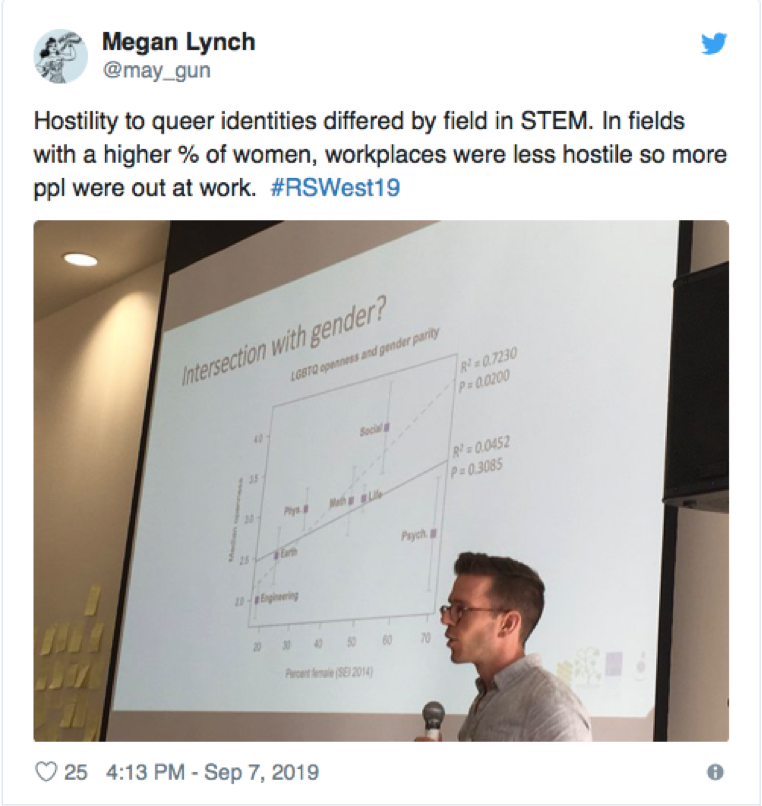
For me personally, the most memorable part of the workshop was a group discussion let by Dr. Alberto Soto. Dr. Soto is a Mexican-American scientist from Pomona, California. He described the work of being an underrepresented minority in science as sort of a “Second Job”. As a group, we agreed that some parts of the second job are definitely standard work- such as leading diversity committees, or writing blog posts… but other things not so much.
As minorities, we may find ourselves taking on extra mentees, because we share an identity with them and want to help them. We may spend extra time advocating for our own needs or rights. We take on extra emotional labour, such as explaining our identity to others, or comforting members of our community who have experienced discrimination. We might even spend days creating and running an entire workshop, just to help other minority scientists survive. All this time and energy adds up to the second job.
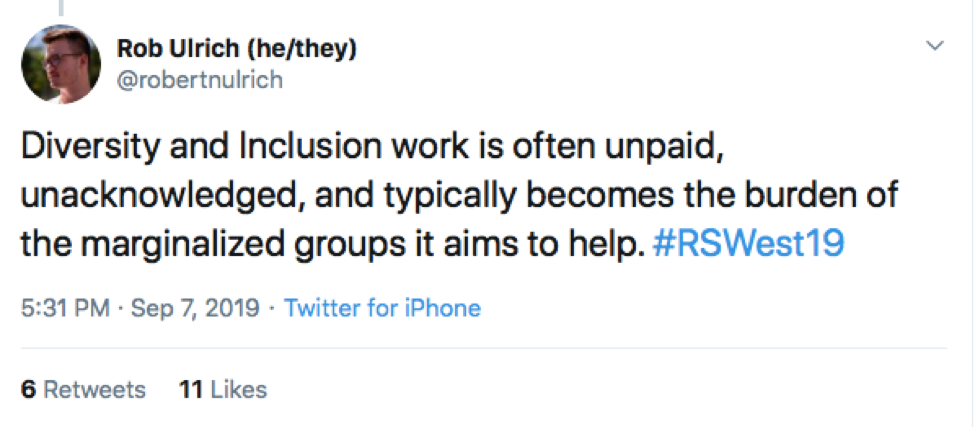
As a group, we agreed that second job activities are very important to us, but, they cut into time we could be spending on our research. We are often personally asked to participate in second job activities, and feel unable to say no. Also, second job activities take extra energy because they are so deeply personal. I personally feel this way a lot- I would love to put my head down and just focus on my thesis, but when people in my department are being homophobic or transphobic, I can’t just ignore. It’s too personal.
Then we talked about Dr. Chanda Prescod-Weinstein (she/her/they), an Assistant Professor of Physics and Astronomy. She is also a Core Faculty Member in Women’s Studies at the University of New Hampshire, and a columnist for New Scientist. On top of all that, she is an incredible advocate for underrepresented minorities in STEM. This quote by them summarized the discussion nicely:
“Maybe it’s true that I would write more papers if I stopped giving Black, Latinx, and Native American students the needed time and love and attention that their departments are too unconcerned and sometimes incompetent to give. But maybe I’d also hate myself so much that I wouldn't’t be able to function anymore. As a Black person, I was raised to value and care for my community, not to turn my back on them for my own gain. And the safe space I seek to create for them? I want that shelter too. This work is for me as well as them, so that when I retire/ leave the field, it looks different and feels different from the one I started in. “
At the end of the day at Reclaiming STEM, I felt deeply inspired by my colleagues, but also incredibly tired. The workshop was only one day (an organizer mentioned that this was a funding issue), so we were there from dawn to dusk. I had spent 12 hours thinking about all the work that still need to be done to make STEM a truly inclusive place. I thought about the people who couldn’t make it to Reclaiming STEM due to financial or physical barriers. I thought about all the potential scientists who aren’t even in STEM fields anymore due to barriers they faced as minorities. I felt the weight of the diversity problem in STEM, and honestly, I had to step out of the workshop during the closing keynote. I was overwhelmed, and sad, and tired. Minority scientists are tired. Diversity and inclusion is everyone’s problem, and it feels unfair that we are doing this work alone.
At the end of the group discussion, Dr. Soto asked us what we want allies to do to support us. Overwhelmingly, the answer was to listen, and take on some of the second job activities work yourself. So reader, if you’ve made it this far, congrats! You’re already doing it. You can do more by following the speakers and organizers of Reclaiming STEM on twitter:
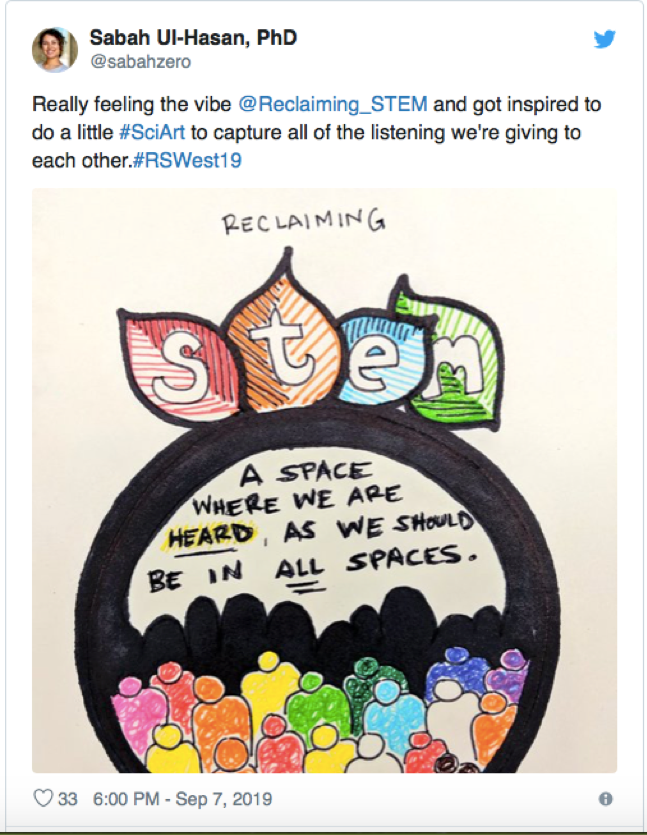
By: Danielle Hoefelle (She/They)
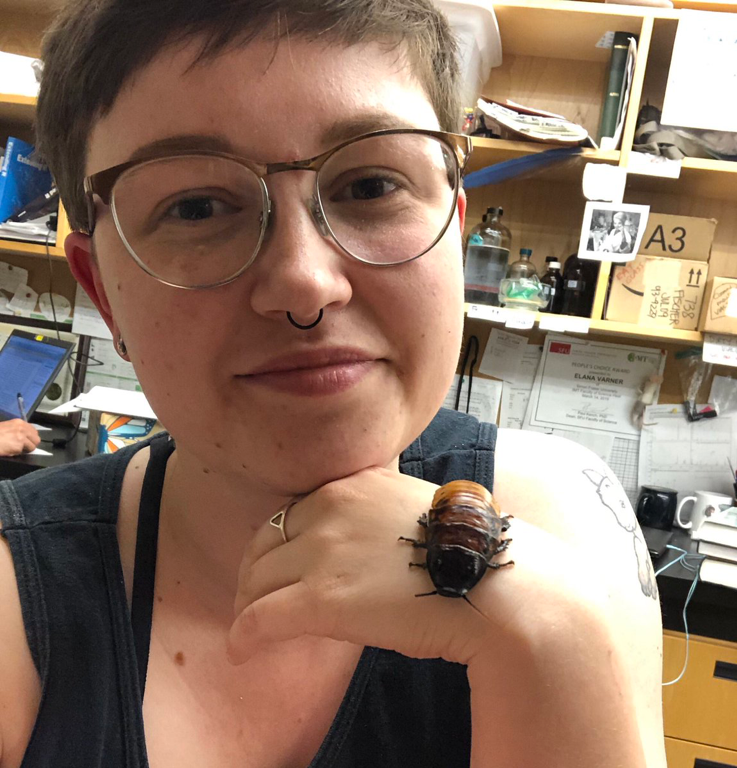
I am a student in the Masters of Pest Management program at Simon Fraser University. I study the foraging and communication of an invasive pest, the European Fire Ant. My science interests include ecology, entomology, animal behavior, and animal/human interaction. My personal interests include biking, drag, feminism, weird art, and cats.
I am currently an outreach facilitator for SFU’s Science in Action, where I create and run programs for children of all ages to learn about insects. I am fascinated about the communication of science to non-experts. I am extremely curious about pseudoscience and misinformation, and how people come to believe in it. I think a lot about how to make science and scientists more approachable.
I am a queer woman in science, something which I have made a point of highlighting in my communication and outreach work. I feel strongly about making science a place where everyone feels welcome, and I think representation is an important part of that.
